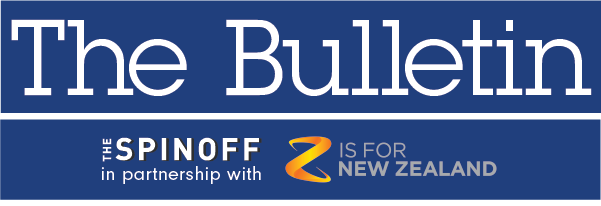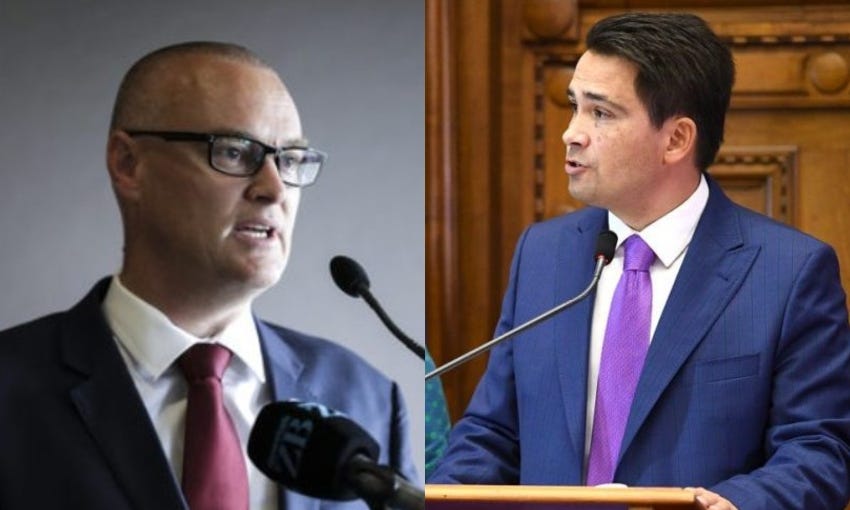Ups and downs at parliament as parties make final shuffles
These are likely to be the last lineup changes in Labour and National before the election

Good morning and welcome to The Bulletin for Friday 3 July, by Alex Braae for The Spinoff. Presented in partnership with Z Energy.
In today’s edition: Clark out and Bridges back in, Chinese embassy warns NZ politicians to not speak out on Hong Kong, and terrible new revelations about Oranga Tamariki culture.
Just so you're aware: We've had some website problems overnight, and it seems to be all back up and running now, though there may still be some gremlins. Apologies if you encounter one.

Image: David Clark is out and Simon Bridges is back in for their respective parties (Radio NZ and Getty Images)
It has been a day of reshuffling at parliament, with both major parties making significant moves. We'll start with Labour, because theirs involves the government. David Clark is no longer the health minister, after resigning yesterday morning. It was a resignation that everyone sort of knew would be coming sooner or later, truth be told, after the transgressions during lockdown meant he was on borrowed time. And he went out with dignity, thanking frontline health workers and ministry staff for their service.
Clark will still be standing in the Dunedin constituency at the election. And there is hope from his predecessor in that seat Pete Hodgson that Clark could one day make a return to cabinet, reports the ODT. He believed that despite the high profile blunders, "he has been, in my view, a very successful minister of health". In particular, Clark's colleagues are highlighting the work he did to increase mental health support in the health system. Our political editor Justin Giovannetti has done an excellent job explaining the politics of it all, particularly the strangeness of the health minister having to go after what for all intents and purposes was a pretty successful government effort on Covid-19.
The new health minister – until the election at least – will be incumbent education and state services minister Chris Hipkins. Why him, when he's already rather busy? Newshub reports that PM Ardern says it's basically a case of him being a safe pair of hands – "the reason I chose Minister Hipkins is in part because of the experience he has with an operational ministry of significant scale but also his role in state services," to use her exact quote. Hipkins told Checkpoint that he believes it is possible to do both jobs, but certainly won't be doing both forever.
As for National, the day marked a return for recently ousted leader Simon Bridges. When caucus gave him the boot, he asked Todd Muller for the foreign affairs portfolio as compensation, and didn't get it. Now he has, after it was taken off Gerry Brownlee. Muller told Checkpoint last night that there was no bad blood between him and Bridges, and that he was glad to be able to give him the opportunity to come back into the fold. Bridges will move up to 17 in the caucus rankings, taking the spot vacated by the highly-regarded Whangārei MP Dr Shane Reti. He will move up to 13, Paula Bennett's old spot, and will also take up the drug reform portfolio from her.
Just quickly, a message from The Spinoff's managing editor Duncan Greive:
"The arrival of Covid-19 and lockdown changed The Spinoff, transforming our editorial to focus on the biggest story of our lives, taking a small team and making it a seven day a week news operation. But it also fundamentally changed us as a business, too. Prior to the crisis, around 20% of our editorial costs were funded by our Members. Now, that figure is north of 50%. If you're already a member, please know that all at The Spinoff are incredibly grateful for your help. If you're not, and would like to contribute, please consider doing so – support is important to our ability to cover the next phase of the crisis, in all its complexity."
After New Zealand MP's criticised the draconian new security law imposed on Hong Kong by China, a warning has come back from the embassy, reports Amelia Wade for the NZ Herald. Foreign minister Winston Peters expressed serious concerns about the legislation, saying it is "a critical moment for fundamental human rights and freedoms protected in Hong Kong for generations". In response, the Chinese embassy in NZ told the country to "stop interfering in Hong Kong affairs and China's internal affairs". Hundreds of arrests of protesters have been made in the city since the law passed, and we'll have much more coverage in today's edition of the Bulletin World Weekly for Spinoff members.
The long investigation into the culture of Oranga Tamariki has continued, with a team of Newsroom's investigative journalists releasing another deeply troubling feature. The piece looks at how social workers are pushed to toe the line and not speak out against issues they encounter, with flow-on effects that hurt children already living in hardship. A key quote: “Stand up and you stand alone,” as one Oranga Tamariki staffer explained, “it’s way easier to just keep your head down and not make yourself a target”. Māori leaders are furious at what has been uncovered, reports Te Ao News, and there have been calls for those at the top to be removed so that the organisation's culture can be overhauled.
I'm bumping this story up to the news section from sport, because it's starting to get very big and hairy. The NZ Herald reports the government has suspended funding to Emirates Team NZ while various investigations are undertaken. There wasn't much more to the statement than that because of reasons of commercial sensitivity and not wanting to undermine the investigations, but it shows MBIE are getting increasingly worried about the situation. Meanwhile, NZME has been served an injunction against publishing details of a report commissioned by the Crown into the spending of public money, which the media company says it will fight on the grounds of public interest.
The Electoral Integrity Act – colloquially known as the 'waka-jumping law' – is looking in a bit of trouble after a repeal bill was drawn from the member's ballot. This was the law that effectively stopped MPs from being able to leave their party, without either a by-election or said party being able to replace them with a candidate of their choosing. As Newshub reports, the Greens and National could work together in this specific area to repeal it. It only passed in the first place because the Greens wanted to create goodwill with NZ First (which didn't turn out great for them anyway) and many in the party made their views clear on why they hated the legislation so much, including former co-leader Jeanette Fitzsimons.
The Greater Wellington Regional Council looks set to fund a major wetland restoration project in Kāpiti, reports Olivia Wannen for Stuff. The project has the potential to sequester large amounts of carbon (wetlands are very good for this) as well as restoring some of the native biodiversity of the region. A 100ha project will almost definitely go ahead, but considerations are being made for whether that should be increased in size – as climate committee chair Thomas Nash put it, "scale matters. If you just do 100ha, that's good but if you can do 200ha, that's more than doubly good – substantially better in terms of carbon reductions."
Rough sleeping was virtually eliminated during the Covid-19 lockdown, so could the problem actually be fixed for good with the right political will? That's the question addressed by this fascinating episode of The Detail, which draws on the knowledge of NZ Herald social issues reporter Isaac Davison and NGO worker Aaron Hendry. It was one of those situations that showed that it isn't inevitable for people to suffer terribly, and perhaps should have to suffer in the future either. It was also another example of how New Zealand's Covid-19 response was far more humane than many comparable countries.
Got some feedback about The Bulletin, or anything in the news?
Drop us a line at thebulletin@thespinoff.co.nz

Right now on The Spinoff: Michael Andrew writes about the marching on of the living wage movement, particularly since the country came to know the term 'essential worker'. Awatea Mita writes about the pernicious and damaging effect a change to the remand system has had on women in the justice system. Elly Strang writes about how lockdown forced changes to the way small businesses operated online, and how many of those changes might stick. Mat Brown looks at the way Covid-19 changed how we think about homes. Emily Writes sits in on a definitely real and not fictitious reputation management crisis meeting for two well known wellness influencers.
And this piece is a remarkable exploration about the way that internet traffic actually works. A while ago, Josie Adams wrote the most popular post in The Spinoff's history, debunking a fringe conspiracy theory that few will have heard of. Now she's written an update that explores the question of how and why that particular piece went so big.
For a feature today, an interesting analysis of why some of our dairy exports are being bought, and whether it is likely to last. Interest's Guy Trafford has looked into sales of whey protein in China – and it's not that there's anything wrong with the product, but it certainly isn't capable of some of what some consumers claim. Down the line, that could mean the market collapses. Here's an excerpt:
The major purchasers appear to be mothers of young children who buy it as a supplement to their infant formula powder. A major reason for the surge in popularity are the claims being made on social media on the ‘powers’ of the products.
It is a trend that raised the eyebrows of Reuters, so much so that they did a fact check on the claims. However, not surprisingly they found no evidence that either lactoferrin or whey proteins have any ability to prevent corona virus infections.
The US-based Whey Protein Institute advises consumers, “to be clear: you shouldn’t take a scoop of whey protein you bought online or at a supplement store, mix it in liquid, and feed it to an infant” because of possible protein toxicity.
In sport today, a remarkable story about an athlete using their power for good. WNBA star Maya Moore took a year away from the sport to help overturn the wrongful conviction of a man who was 22 years into a 50 year prison term. And according to Bleacher Report, he was just released yesterday. Just to give you a sense of how big a call it was from Moore, she's a 4-time WNBA champion, finals MVP and season MVP, so it's sort of like someone on the level of Richie McCaw devoting a year of their career prime to correcting an injustice. Magnificent result, and sport really was the winner on this particular day.
That's it for The Bulletin. If you want to support the work we do at The Spinoff, please check out our membership programme




